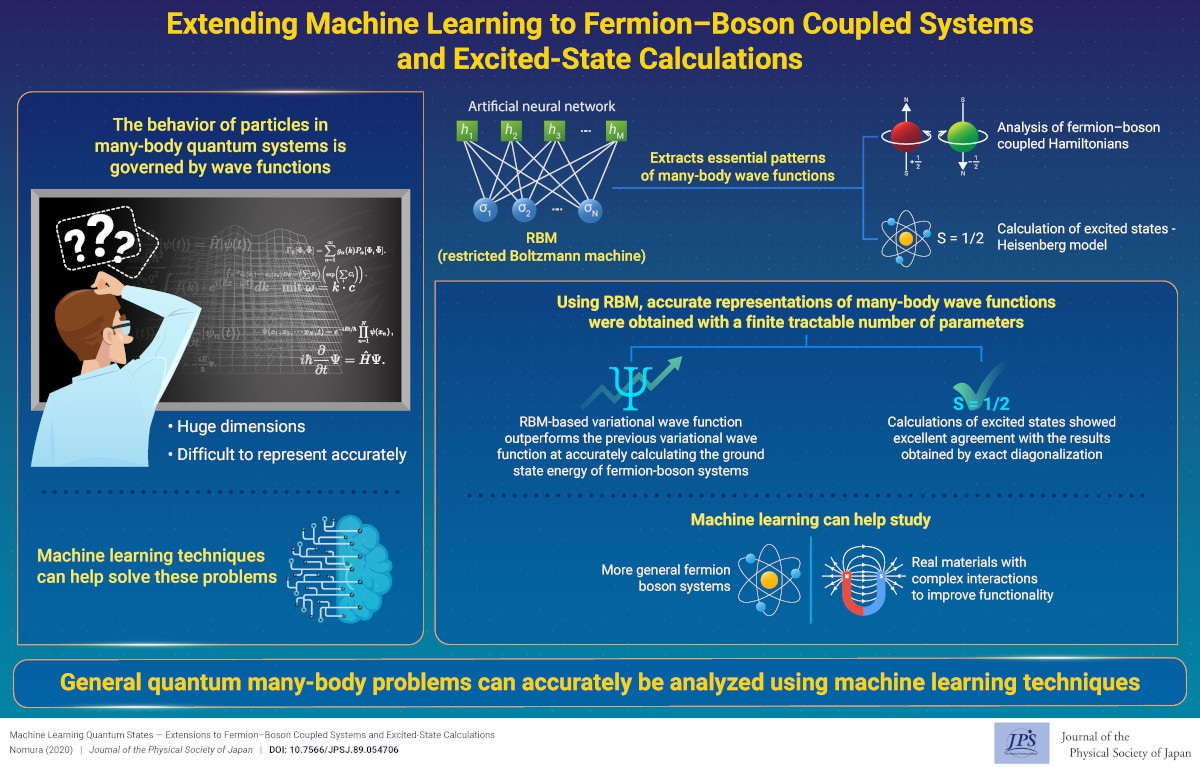Extending Machine Learning to Fermion–Boson Coupled Systems and Excited-State Calculations
© The Physical Society of Japan
This article is on
Machine Learning Quantum States — Extensions to Fermion–Boson Coupled Systems and Excited-State Calculations
(JPSJ Editors' Choice)
J. Phys. Soc. Jpn.
89,
054706
(2020)
.
We have demonstrated the power of machine learning in representing quantum many-body states accurately. We have extended the applicability of neural-network wave functions and shown their usefulness in fermion-boson-coupled systems and excited-state calculations.
Machine Learning Quantum States — Extensions to Fermion–Boson Coupled Systems and Excited-State Calculations
(JPSJ Editors' Choice)
J. Phys. Soc. Jpn.
89,
054706
(2020)
.
Share this topic
Fields
Related Articles
-
Qualitative Changes in Kinetic Pathways Driven by Hydrodynamic Interactions in Dense Colloidal Suspensions
Cross-disciplinary physics and related areas of science and technology
Statistical physics and thermodynamics
Structure and mechanical and thermal properties in condensed matter
2025-4-18
Even in dense colloidal suspensions, where long-range hydrodynamic interactions are screened, near-field hydrodynamic interactions qualitatively influence the selection of kinetic pathways.
-
Higher-Order Topological Phases in Magnetic Materials with Breathing Pyrochlore Structures
Electronic structure and electrical properties of surfaces and nanostructures
Magnetic properties in condensed matter
Mathematical methods, classical and quantum physics, relativity, gravitation, numerical simulation, computational modeling
2025-4-7
A simple example of a higher-order topological phase, in which the symmetry decreases step-by-step from the bulk to the corner, is realized in a magnetic system with a pyrochlore structure and is characterized by a series of quantized Berry phases defined for the bulk, surface, and edge.
-
Existence of Chiral Soliton Lattices (CSLs) in Chiral Helimagnet Yb(Ni1-xCux)3Al9
Magnetic properties in condensed matter
2025-4-1
Our study examines the magnetic structure of the monoaxial chiral helimagnet Yb(Ni1-xCux)3Al9, providing first direct evidence of the formation of chiral soliton lattice state.
-
Understanding Pressure-Induced Superconductivity in CrAs and MnP
Magnetic properties in condensed matter
2025-3-10
This study reviews existing research on the pressure-induced variation of magnetic properties of transition metal mono-pnictides like CrAS, MnP, and others, aiming to understand the unconventional superconductivity observed in CrAs and MnP.
-
Symmetry and AI: Building the Future of Physics Simulations
Magnetic properties in condensed matter
Measurement, instrumentation, and techniques
2025-2-18
Generative artificial intelligence (AI) has gained considerable attention in scientific fields. By embedding physical symmetry into AI before training, we created a faster and lighter model. Scaling improves the accuracy and unlocks the potential of physics research and applications.





